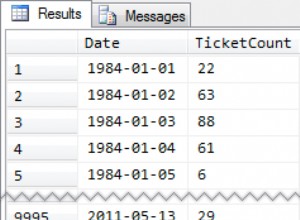Ho visto un pacchetto chiamato as_xlsx di Anton Scheffer, Crea un file Excel con PL/SQL e ha risolto il mio problema. L'ho anche modificato un po' per inserire i nomi dei fogli di lavoro e per consentire SYS_REFCURSOR come parametro invece di un VARCHAR2 come richiesto nel mio post precedente (restituire l'istruzione SQL di un cursore esplicito).
L'ho aggiunto nelle specifiche del pacchetto per il sovraccarico delle procedure:
procedure query2sheet
( p_cur IN OUT SYS_REFCURSOR
, p_column_headers boolean := true
, p_directory varchar2 := null
, p_filename varchar2 := null
, p_sheet pls_integer := null
, p_sheetname varchar2 := null
);
L'ho aggiunto nel corpo del pacchetto per il sovraccarico della procedura (nota:i commenti di riga erano righe che ho modificato):
procedure query2sheet
( p_cur IN OUT SYS_REFCURSOR
, p_column_headers boolean := true
, p_directory varchar2 := null
, p_filename varchar2 := null
, p_sheet pls_integer := null
, p_sheetname varchar2 := null
)
is
t_sheet pls_integer;
t_c integer;
t_col_cnt integer;
t_desc_tab2 dbms_sql.desc_tab2;
t_desc_tab dbms_sql.desc_tab;
d_tab dbms_sql.date_table;
n_tab dbms_sql.number_table;
v_tab dbms_sql.varchar2_table;
t_bulk_size pls_integer := 200;
t_r integer;
t_cur_row pls_integer;
t_d number;
begin
-- Changed
if p_sheetname is not null then
new_sheet(p_sheetname);
else
new_sheet;
end if;
-- End of Change
--t_c := dbms_sql.open_cursor;
--dbms_sql.parse( t_c, p_sql, dbms_sql.native );
t_d := DBMS_SQL.TO_CURSOR_NUMBER(p_cur);
--dbms_sql.describe_columns2( t_c, t_col_cnt, t_desc_tab );
dbms_sql.describe_columns( t_d, t_col_cnt, t_desc_tab );
for c in 1 .. t_col_cnt
loop
if p_column_headers
then
cell( c, 1, t_desc_tab( c ).col_name, p_sheet => t_sheet );
end if;
--dbms_output.put_line( t_desc_tab( c ).col_name || ' ' || t_desc_tab( c ).col_type );
case
when t_desc_tab( c ).col_type in ( 2, 100, 101 )
then
--dbms_sql.define_array( t_c, c, n_tab, t_bulk_size, 1 );
dbms_sql.define_array( t_d, c, n_tab, t_bulk_size, 1 );
when t_desc_tab( c ).col_type in ( 12, 178, 179, 180, 181 , 231 )
then
--dbms_sql.define_array( t_c, c, d_tab, t_bulk_size, 1 );
dbms_sql.define_array( t_d, c, d_tab, t_bulk_size, 1 );
when t_desc_tab( c ).col_type in ( 1, 8, 9, 96, 112 )
then
--dbms_sql.define_array( t_c, c, v_tab, t_bulk_size, 1 );
dbms_sql.define_array( t_d, c, v_tab, t_bulk_size, 1 );
else
null;
end case;
end loop;
--
t_cur_row := case when p_column_headers then 2 else 1 end;
t_sheet := nvl( p_sheet, workbook.sheets.count() );
--
--t_r := dbms_sql.execute( t_c );
loop
--t_r := dbms_sql.fetch_rows( t_c );
t_r := dbms_sql.fetch_rows( t_d );
if t_r > 0
then
for c in 1 .. t_col_cnt
loop
case
when t_desc_tab( c ).col_type in ( 2, 100, 101 )
then
--dbms_sql.column_value( t_c, c, n_tab );
dbms_sql.column_value( t_d, c, n_tab );
for i in 0 .. t_r - 1
loop
if n_tab( i + n_tab.first() ) is not null
then
cell( c, t_cur_row + i, n_tab( i + n_tab.first() ), p_sheet => t_sheet );
end if;
end loop;
n_tab.delete;
when t_desc_tab( c ).col_type in ( 12, 178, 179, 180, 181 , 231 )
then
--dbms_sql.column_value( t_c, c, d_tab );
dbms_sql.column_value( t_d, c, d_tab );
for i in 0 .. t_r - 1
loop
if d_tab( i + d_tab.first() ) is not null
then
cell( c, t_cur_row + i, d_tab( i + d_tab.first() ), p_sheet => t_sheet );
end if;
end loop;
d_tab.delete;
when t_desc_tab( c ).col_type in ( 1, 8, 9, 96, 112 )
then
--dbms_sql.column_value( t_c, c, v_tab );
dbms_sql.column_value( t_d, c, v_tab );
for i in 0 .. t_r - 1
loop
if v_tab( i + v_tab.first() ) is not null
then
cell( c, t_cur_row + i, v_tab( i + v_tab.first() ), p_sheet => t_sheet );
end if;
end loop;
v_tab.delete;
else
null;
end case;
end loop;
end if;
exit when t_r != t_bulk_size;
t_cur_row := t_cur_row + t_r;
end loop;
--dbms_sql.close_cursor( t_c );
dbms_sql.close_cursor( t_d );
if ( p_directory is not null and p_filename is not null )
then
save( p_directory, p_filename );
end if;
exception
when others
then
--if dbms_sql.is_open( t_c )
if dbms_sql.is_open( t_d )
then
--dbms_sql.close_cursor( t_c );
dbms_sql.close_cursor( t_d );
end if;
end query2sheet;
Questo è un blocco di esempio nella mia richiesta simultanea che crea il file:
Procedure EMP_ROSTER_REPORT (p_empno per_all_people_f.employee_number%type
, p_bg_id per_business_groups.business_group_id%type
, p_email_add per_all_people_f.email_address%type)
is
l_fh UTL_FILE.FILE_TYPE;
l_directory VARCHAR2(30) := 'EXT_TAB_DATA';
l_filename VARCHAR2(100);
emp_cur SYS_REFCURSOR;
l_message varchar2(100);
g_stage varchar2(100);
g_zipped_blob blob;
cursor p_payroll_cur is
select payroll_id
, payroll_name
, business_group_id
from pay_all_payrolls_f
where business_group_id = p_bg_id;
BEGIN
-----------------------------------
g_stage := 'setting the filename';
-----------------------------------
l_filename := 'EMPLOYEE_ROSTER_REPORT_'||TO_CHAR(SYSDATE, 'DD-MON-YYYY-HHMISS');
------------------------------------------
g_stage := 'Assigning Emp SysRefCursor';
------------------------------------------
for i in p_payroll_cur loop
OPEN emp_cur FOR
SELECT 'extra long query here with parameters'
from table_a
where payroll_id = i.payroll_id;
----------------------------------------------------------
g_stage := 'open Employee Cursor and write into the File';
----------------------------------------------------------
as_xlsx.query2sheet( p_cur => emp_cur -- Uses Sys_RefCursor Instead of Dynamic SQL (Varchar2)
, p_sheetname => i.payroll_name); -- This is where we assign the Sheet Names
as_xlsx.freeze_pane( 1,1 ); -- Freeze the topmost and rightmost pane in the Excel Sheet
end loop;
------------------------------
g_stage := 'Create the File';
------------------------------
as_xlsx.save( l_directory , l_filename||'.xlsx');
END EMP_ROSTER_REPORT;
Spero che questo aiuti qualcuno! :)




